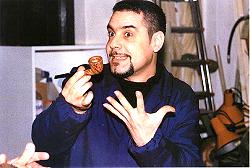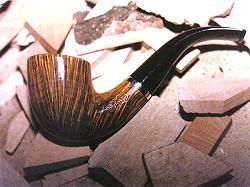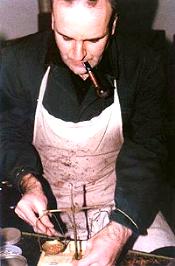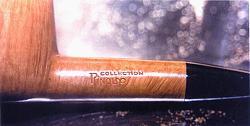sum of its parts
The Rinaldo brothers have dedicated their lives to the perfection
Of many separate techniques and integrating them toward a final, perfect product
by Chuck Stanion

Elio Rinaldo is pictured above
"Sorry," says Steve. "We don't understand. We're Americans." The man, unimpressed, repeats the lilting Italian sentence. "You'll have to excuse us," I say. "We're deaf-mute escaped convicts." Steve smiles. "Yes," he says. "And we're dangerously insane armed terrorists. Please inform your government. But the man won't go away. He holds up a piece of paper significantly.
"Tick-ets," he says.
"Ahh," says Steve. "He must be the conductor." "Oh," I say. We hand over our paperwork. The man examines it and hands it back. He looks at us for a moment decides that he can't possibly make us understand what he wants to say, turns and leaves.
"Any idea how we'll know when get to Pesaro?" I ask, watching as row after row of grape vines whiz past the train window. The sun is getting higher in the morning sky, and the light on the passing vineyards and stone farmhouses is a rich, warm yellow.
"Nope," says Steve. "Guess we just look for signs and watch the map." and then the small speaker in the compartment blares out some Italian. but it may as well be polka music; it's useless to us. But we don't care. We're happy to be in Italy.
The Rinaldo brothers will be waiting at the station for us, smoking pipes so we can recognize them. It's too bad that pipe smoking is so uncommon that it can be used as a distinguishing characteristic in a crowd. But, on the other hand, its nice to be in a country where you can smoke in a crowd without being scowled at, sworn at, hosed down or ticketed.

"You have no idea," I ask Steve, "what these fellows look like?"
"None," he answers. "I've communicated with them mainly by fax. They don't speak any English. I have to have their faxes translated when they come in." Steve has been importing Rinaldo pipes to the U.S. since 1998, shortly after he bought his first Rinaldo at the CORPS pipe show in Richmond, Virginia. It was love at first puff.
Steve smoked it on the drive home from that show and was immediately impressed. "It was a smooth, clean, neutral smoke from the very first." He did some research and found that Rinaldo pipes had been briefly imported into the U.S. in the late '80s, but had not been available since. He contacted the Rinaldos, who sent some shape charts and pricing guides for him to look over. "They looked great," says Steve. "I had to have them. We worked out a deal for me to distribute the pipes, and it has been a challenge to keep any in stock ever since. I'm hoping to talk them into letting me have a larger allotment of pipes this year." Rinaldo distribution is divided equally among Italy, Germany and the U.S., but Steve is ready to argue that a larger percentage should go to the U.S.
The train am is slowing, but we don't see any signs that indicate where we are. The conductor comes back into the compartment and looks at us. "Insane convicts," he says. He points out the window. "Pesaro."
Guido Rinaldo is pictured
below

We laugh and gather our bags, thanking the conductor as we make our way out. We are down the steps and jumping onto the station platform the moment the train stops. Solid ground always feels a little strange after a train ride, and I make my way unsteadily through the moderate crowd to a bench where I can put down my camera bag and light a pipe.
The choice of pipe is important to me for interviews. People in this industry always notice what you are smoking. I try to smoke a pipe made by the folks I'm visiting if I own one and 11 will fit safely in my bag. I don't own a Rinaldo, and since I've not met these people, and don't know how sensitive they are, I decide to choose conservatively. They may feel competitive with Castello, so that pipe is out ... I'd better avoid Italian pipes altogether -hmmm-something Danish? Wait- I should smoke an American pipe. The Rinaldo brothers have probably not seen any, and it's only natural. I fill my favorite Paul Bonaquisti with good American tobacco-McClelland #27 (pre-rubbed-out; I'm a prepared kinda guy)-light up, get it going well, pull my camera bag back up on my shoulder, and look around, puffing contentedly.
Steve Monjure has disappeared. People glance curiously at me as they walk by, probably because I'm smoking a pipe and wearing sneakers (no one in Italy seems to wear sneakers).
 I choose a direction and start walking, confident that it is the wrong
way, and that feeling is confirmed when after a few steps I hear
Steve's voice calling from behind me.
I choose a direction and start walking, confident that it is the wrong
way, and that feeling is confirmed when after a few steps I hear
Steve's voice calling from behind me.I turn and make my way back through the crowd and find Steve standing with two men, the taller of whom is smoking a beautiful silver-banded Rinaldo smooth billiard. Steve introduces me to Guido and Elio Rinaldo. They look nothing like brothers. Elio is the more physically dynamic of the two, though he is smaller in stature than his brother. His gestures are large and geometrically precise, like those of a Shakespearean actor.
Guido seems more introspective, with a tendency to look into space and concentrate on his choice of words. Like his brother, though, he talks quickly and cordially. Everyone is immediately comfortable, and we all talk at once, none of us understanding the others until we reach the car, where a young woman named Sabine Witt is waiting for us. She is a friend of the Rinaldos who has agreed to translate for us, and at last we can all connuunicate.
After a stop for coffee and pastry, we arrive at the Rinaldo workshop, located in a free-standing warehouse in a part of town that is both residential and industrial. The shop is one large room, with piles of briar in different stages of aging scattered here and there, and necessary industrial machinery throughout. It is a neat, well-organized shop which obviously operates efficiently. We all decide that the best way to understand the Rinaldo story is to watch the brothers make pipes, and they do so, stopping to explaining what they are doing as they go. It's a confusing but fun process, with the loud machinery buzzing along, the vacuum systems roaring, everyone smoking, everyone shouting over the noise, and poor Sabine trying to hear and translate the simultaneous talk of four enthusiastic pipe lovers.
"All our briar," says Guido, hefting a block in his hand "is Ligurian, and is hand-selected. We buy the best available, but, of course, no briar is perfect."
"And we wouldn't want it to be," says Elio. "It is a natural material, and its beauty is in the fact that it is not all the same. If it was all perfect, all identical then all pipes would look alike-you may as well have them all machine-made."
"Briar," says Guido, "is like women." I've been in Italy for three days, and have heard every topic of conversation compared to women in that time. Cars, wine, food, shoes, weather but what do you expect? It's Italy. A beautiful woman always has something that is broken," Guido continues. Confused, I ask Sabine for clarification on that point. She retranslates. "A beautiful woman always has some characteristic that is imperfect," says Guido. "But she is beautiful just the same. Briar is never perfect, but it is always beautiful."
(Continue to PAGE 2 of the article)
(Return to the Rinaldo Home Page)